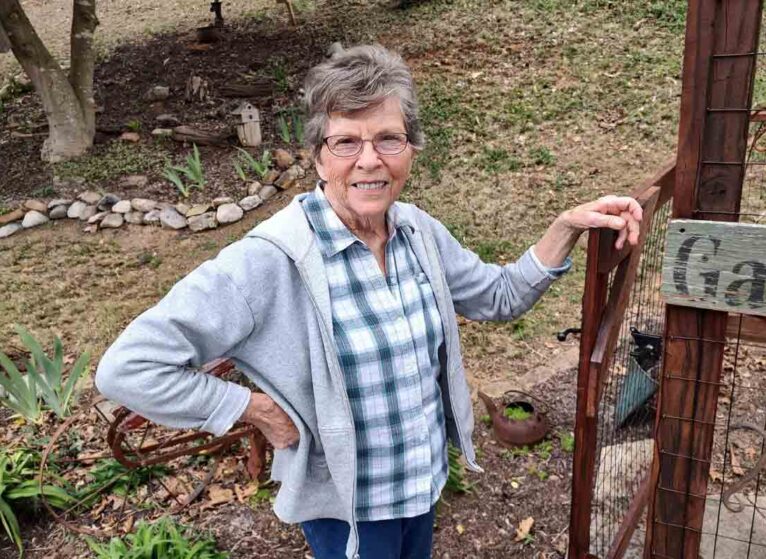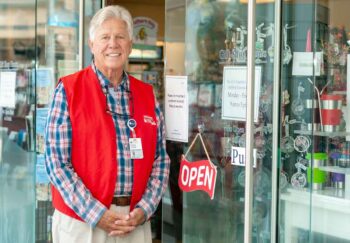Lorraine Roberts loves nothing more than tending to her garden and walking the trails around her home, nestled in the woods of Virginia’s Roanoke valley. At 78, she was healthy and enjoying life. But then her life suddenly turned upside down: She started coughing up blood. Doctors suspected lung cancer, but it was aggressive thyroid cancer.
So aggressive, it almost strangled her.
Lorraine had long assumed thyroid cancer was one of the "better" cancers.
She shares, "My sister had thyroid cancer about 30 years ago. But it was a pretty simple thing for her. Mine was more serious because I had a tumor growing on my windpipe. And it was going to strangle me."
Aggressive thyroid cancers make up about 15% of thyroid cancers. So it's important to know what it is, how to spot it, and where to turn for treatment. We use Lorraine’s story as our guide.
In the video below, Lorraine and her UVA Health surgeon share her incredible story. Spoiler alert: It has a happy ending.
What Does the Thyroid Do?
Our thyroid is among a group of glands (endocrine system) that control hormones. The thyroid makes hormones that help regulate our body's heart rate, blood pressure, temperature, and metabolism (how we convert food into energy).
How Can Thyroid Cancer Strangle Someone?
A small butterfly-shaped gland, the thyroid sits in the front of the neck. Its 2 wings (lobes) wrap around the windpipe (trachea).
Thyroid cancer begins in the thyroid gland. It comes in all shapes and sizes. In some cases, you can just watch a small, slow growing tumor. When treatment is needed, it usually involves surgery to remove part or all of the gland.
Invasive or aggressive thyroid cancers cancers can grow quickly. Some can eventually cut off the airway.
Papillary Thyroid Cancer Normally Not Aggressive
Strangely, Lorraine didn't have anaplastic thyroid cancer, which is the most aggressive type. She had papillary thyroid cancer — the most common type of thyroid cancer and usually not aggressive.
"With most thyroid cancers, the prognosis is great. But Ms. Roberts had a life-threatening type of thyroid cancer," says UVA Health otolaryngologist David Shonka, MD, who specializes in head and neck surgery.
He adds, "Without surgery, her tumor would likely grow large enough so she wouldn't be able to breathe. Or she would have problems breathing because of bleeding from the tumor into the lungs."
I had so much prayer from my church, my family and friends. Not sure if I could have made it without their support. And my faith in God is so strong, I was never afraid. But I sure am glad to be here today and so glad I met Dr. Shonka.
Lorraine Roberts
Lorraine's Symptoms of Aggressive Thyroid Cancer
Healthy her whole life, Lorraine’s first signs of aggressive thyroid cancer came out of the blue. She began:
- Coughing up blood
- Having trouble swallowing
- Sounding hoarse
- Always needing to clear her throat
At First, a Scary Thyroid Cancer Prognosis
Facing Head or Neck Cancer?
Find a UVA Health surgeon who specializes in thyroid, mouth, and other head & neck cancers.
After some tests, Lorraine got terrible news from her local healthcare providers. "They told me I had about three months to live," she shares.
First told surgery wasn’t an option, she began radiation therapy and chemotherapy to try to shrink the tumor. But then she met with an endocrinologist in Roanoke.
Suhail Dar, MD, knew Lorraine needed the expertise of UVA Health otolaryngologists in Charlottesville. "Dr. Dar is familiar with Dr. Shonka's work and reputation. I credit him with putting me on the right track and making the connection for me."
Lorraine Learns Surgery Can Save Her Life
When Lorraine met Shonka the next week, she knew right away she was in good hands. Shonka does many thyroid cancer surgeries. Lorraine’s was particularly challenging.
Shonka needed to remove her thyroid and 2 inches of her windpipe, while protecting the nerves that control breathing and speaking. These nerves sit close to the thyroid and windpipe. When a segment of the windpipe is removed, it must be put back together. During this part of the surgery, Shonka teamed up with fellow otolaryngologist James Daniero, MD. He specializes in airway reconstruction.
"It's a complex and technically challenging surgery," Shonka says. "You have to remove the cancer entirely. Then you have to put everything back together in a way that allows the patient to have a good voice and to be able to breathe well."
She Sails Through a Big Surgery
Lorraine’s surgery went beautifully, Shonka says.
She is able to breathe well. And the small nerves that move her vocal cords were preserved and are working perfectly. Tests over the past 2 years have shown no signs of cancer. In church, she’s noticed her singing voice is only slightly different. Most importantly, she’s back to enjoying country life.
Shonka shares, "Ms. Roberts is tough and came through surgery really nicely. She’s done incredibly well since then."
He adds, "At UVA Health, we have a great team, including our residents and nurses. We can address the most complex thyroid cancers with excellent outcomes."
ANN SLED When I first heard Lorraine's diagnosis, I was in line to pick up my grandchildren from school, and I was devastated.
LORRAINE ROBERTS I was coughing up blood and I went to the doctor. After several weeks, they did an x-ray. That's when they said it was cancer and started the treatments. They just didn't think it could be operated on. The radiation was so hard and the chemo was just sick as a dog. Couldn't eat anything, couldn't swallow. That's when I went to see the endocrinologist and he said, "With your permission, I'd like to refer you to Dr. Shonka at UVA." So I said, "Well, sure." So they called me in 15 minutes and we had an appointment set up for the next week.
DAVID SHONKA, MD So her thyroid cancer was invading into her windpipe, which is what was causing her to have the episodes of coughing up blood. When she was initially seen, it was thought that it would be too risky to do surgery for her. You know she was a little discouraged about how things were going, but really wanted to fight this and beat this cancer. And so even though she had an aggressive tumor and we could tell that surgery was going to be a pretty substantial undertaking, she seemed like she was up for it.
LORRAINE ROBERTS I said, "Are you sure you've done these before?" And he said, "If I didn't think I could do it, I wouldn't put you through it."
DAVID SHONKA, MD We did a thyroidectomy, which means removing the thyroid gland in its entirety, but because it was also invading into the windpipe, we had to remove a segment of the windpipe. It's a complex and technically challenging surgery to save those nerves and to remove the cancer in its entirety. Thankfully, it went beautifully, and she did great.
LORRAINE ROBERTS When I came home from the hospital, the kids had all put up signs all along this private road, "welcome home" and all this stuff. It was just so neat.
DAVID SHONKA, MD So for advanced thyroid cancer, best treatment is surgery. When you put the experience of the providers and the team that we have here, and you add to that a patient who's motivated and in relatively good health and determined, we get great outcomes.
ANN SLED I do think about what would've happened if she hadn't gone for that second opinion. You know we would've lost her.
LORRAINE ROBERTS I know that I have an appointed time to die. I know the Lord's with me. I know the Lord takes care of all that. I had a pretty good outlook on life already. I think I've always been pretty positive. Just makes me realize how precious every day is.

